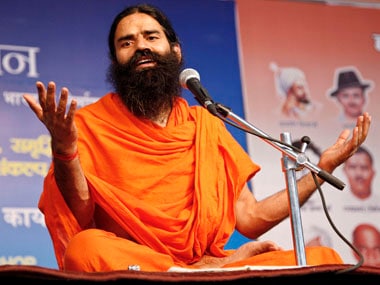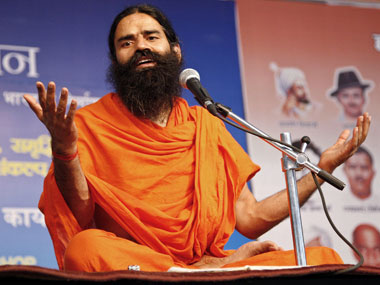Baba Ramdev’s Ptanjali Ayurved Ltd is all set to win a multi-crore contract to manage mid-day meals in Uttar Pradesh schools, according to people in the know. Ramdev and his men have been actively lobbying for the Rs 700-crore contract in New Delhi, reaching out to influential cabinet ministers and making representations as to why the group is best placed to execute the project, the sources said. The contract is currently being managed by 10 entities, including some NGOs. It involves offering Panjiri (a mixture of sugar, ghee and wheat), fruits and milk to at little over 10 crore students in India’s most populous state. Ramdev’s meteoric transformation from the guru of good health to a business magnate has surprised some of the top multinationals operating in India. His business empire has been rapidly expanding. Only in July, the company had won an exclusive, mega contract to develop Ayurvedic plants in Uttarakhand and fix their prices. Patanjali Ayurved is now considered the fastest-growing consumer product company in India. However, there have been controversies too. It has to be remembered that the group has more than once got into trouble with the Advertising Standards Council of India for misleading advertisements. In April, The Economic Times reported that canteen stores department of the Indian defence forces stopped selling Patanjali’s amla juice after it found out that the product was “unfit for consumption”. Further, earlier this month, a local TV channel reported that Patanjali distributed expired products to flood victims in Majuli, Assam. Seen in this context, if the group wins the Uttar Pradesh mid-day meal contract, it will be celebrated as a major victory by the company. The contract will make Patanjali the sole distributor of high-protein food for the state schools. The sources confirmed officials of Haridwar-based Patanjali Ayurved were also lobbying with senior bureaucrats and ministers of the Yogi Adityanath-led BJP government in the state for the contract. The deadline for submission of tenders for the contract was extended to mid-October recently. SK Tijarawala, spokesman for Patanjali Ayurved and Patanjali Yogpeeth, said the group aims to serve healthy food across India, and its venturing into the mid-day meal project is purely a business decision. “We have always propagated the importance of consuming healthy food at schools,” said Tijarawala. [caption id=“attachment_1498799” align=“alignleft” width=“380”]  Yoga guru Baba Ramdev.[/caption] He said it is “baseless” to link the likely contract win by Patanjali to the BJP government of Uttar Pradesh because the company does business on a pan-Indian model and its operations are not linked to one state. The company produces hundreds of herbal and organic products including soap, shampoo, cleaners, juice and honey. Tijarawala said Patanjali has some other mega plans, including a proposal to start fast food counters across India. According to him, there is huge demand for acquiring franchisees of such vegetarian restaurants. Highly placed sources told Firstpost that a large number of non resident Indians (NRIs), especially from Canada, the United Kingdom and the United States, have evinced interest in running such outlets across India. The outlets, it is reliably learnt, are being modelled on Amma Kitchens, the low cost food joints currently operating in Tamil Nadu. Breakfast, lunch, evening snacks and dinner at these eateries are extremely popular with people from all walks of life in the state. “We will be able to roll out the ventures by the end of this year,” said Tijarawala. But the mid-day meal contract, which Ramdev is eyeing seriously and is most likely to win, will put Patanjali in a different league, believe the sources. “He has won one mega contract, and now he is eyeing the next one,” claimed one of the sources in Lucknow. The Uttarakhand government’s contract for ayurvedic plants is a big deal, wherein the company will not only grow expensive medicinal plants across the state but will also decide their prices for acquisition and sale. Market analysts expect Patanjali sales to rise to Rs 20,000 crore in two years given the growing popularity of ayurvedic products, their lower price and the group’s ability to take advantage of the rising nationalism. At a meeting in late August, Uttarakhand Chief Minister Trivendra Singh Rawat told Acharya Balakrishnan of Patanjali that the state government will open up a single window clearance for purchase and sales of all ayurvedic products in the state and Patanjali will set prices for both. Over the years, Uttarakhand has emerged as a major hub of ayurvedic products. Haridwar and Rishikesh have more than 1,000 dealers, manufacturers and suppliers of ayurvedic medicines. However, the Uttarakhand government’s move will give a distinct advantage to Patanjali. “Patanjali has already created a little over 100,000 jobs in the state, this new agreement will help boost both business and employment in the state,” Rawat said in a statement. Rawat said Ramdev - besides creating the jobs - has made a significant contribution to the development of Uttarakhand through his institutions. Over 100 children orphaned in the the 2013 disaster stay at the Patanjali Seva Kendra. Once they complete their schooling, they will be sent to Patanjali University in Haridwar. Not just the ayurvedic sector, the Uttarakhand government has agreed to handover a number of eco-tourism spots in the hilly state to Patanjali too. However, the Opposition Congress has objected to the move. Pritam Singh, Congress leader, has said the move could trigger a monopolistic situation in the state. “This is not a good move. It shows the state government is biased in its decision to hand over such a lucrative market to Baba Ramdev,” Singh said in a telephonic interview. Singh alleged Rawat’s moves were politically motivated, especially in the light of former chief minister Vijay Bahuguna’s bitter relationship with Ramdev. Bahuguna had registered several cases against Patanjali Yogpeeth in the run-up to the 2014 Lok Sabha elections. But Rawat made quick amends and invited Ramdev to Kedarnath to take a look at the reconstruction work undertaken by the state government following the 2013 flash floods. Now, Rawat is seen on the right side of the all-powerful yoga guru and the business magnate is flourishing. Patanjali insiders claim Ramdev is also focussing on India’s Rs 50,000 crore private security market. The group has launched Parakrami Suraksha Private Ltd (PSPL) with help from retired officers of the Indian Army and the Border Security Force. A special campus will be set up, most probably in Haridwar, and over 20,000 youngsters recruited. In a special address on his religious Aastha channel, Ramdev said the idea was to create a domestic team of private guards who will handle security assignments at some of India’s biggest installations and homes. “They will be called Parakrami (which translates into the fearless) and be supremely fit by doing yoga and eating healthy food. There’s no point in body building, even buffaloes have huge figures but it does not work for them, we need people with clear cut thoughts,” the yoga guru told the first batch of recruits. During the address, Ramdev said how the young recruits should breathe correctly, eat herbs and knot themselves into impossible yoga postures, especially the difficult Surya Namaskar, to shape themselves up to challenges of the jobs as security officers. “He is tapping into the renewed faith in the country’s ancient knowledge systems such as yoga and ayurveda. Millions of his followers are buying his products and have faith in him,” says ad guru Gullu Sen. “India’s ayurvedic and yoga market is a $490 billion industry and Ramdev is in the thick of it,” says Sen, adding global consumer product companies have realised that the rise of Ramdev’s products is not a fad. Brokerage firm IIFL Associates projected in a report that Patanjali’s revenue would be $3 billion by 2020. A long-time ally of Prime Minister Narendra Modi, Ramdev routinely hobnobs with powerful politicians and businessmen, participates in Bollywood shows and appears regularly on television shows to discuss how yoga can cure urban stress and trauma. For almost a year, Ramdev - who has no designation in the company and draws no salary - has been claiming he has the cure for AIDS. Patanjali’s distribution network has 80 super stockists and 2,000-3,000 distributors. The company has an advertising budget of Rs 350 crore and is among the top advertisers in the country. Interestingly, it sponsors the Pro Wrestling League. Last week, the yoga guru was seen as the big judge sitting on an over-sized throne in Star Bharat’s bhajan-singing reality show, Om Shanti Om, exhorting participants to stay healthy and regularly sing devotional songs. Media analysts say their dipsticks show Ramdev’s image in India is on an all-time high. Consider this one. In 2016, Indian cricket skipper Virat Kohli was on television once every 8 minutes. But this year, the Indian skipper would be easily beaten to the number 2 spot by Ramdev. That’s encouraging news for Ramdev, and millions of his supporters.
The Patanjali group claims its aim is to serve healthy food across India and the pitch to manage the Uttar Pradesh mid-day meal project is purely a business decision
Advertisement
End of Article


)

)
)
)
)
)
)
)
)



